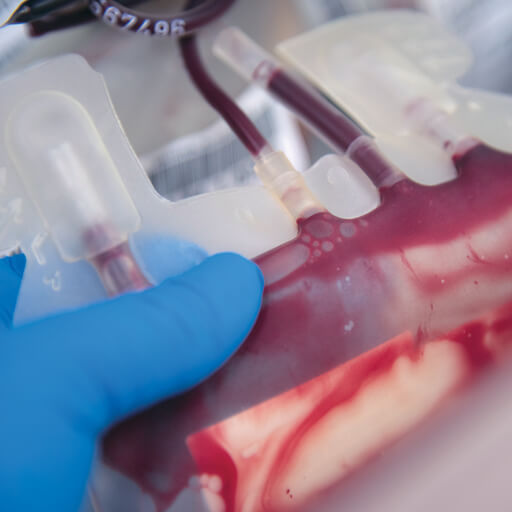Hematology CME
16 - 20 of 20 results
-
FREE
ScientiaCME Factoring Updates In Care And Best Practice Into Our Management Of Hemophilia B
Activity Description / Statement of Need:
In this online, self-learning activity:
Hemophilia is a genetic disease caused by mutation of one of the genes for coagulation proteins leading to dangerous, uncontrolled bleeding. In hemophilia B, a mutation in the gene for factor IX (FIX) leads to an endogenous deficiency in the clotting factor. The incidence of hemophilia B is the same across race and ethnic groups, affecting approximately 1 out of every 30,000 male births.
Target Audience:
HCPs including but not limited to: hematologists, internists, and pediatricians; physician assistants, nurse practitioners, and pharmacists who practice in hematology, and other HCPs who practice in hemophilia treatment center; and any other clinicians with an interest in or who clinically encounter patients with hemophilia B.
See full details chevron_right- Credit hours: 1
- CME credits awarded by: ScientiaCME
- Format: Online On-Demand Course
- Material last updated: February 21, 2025
- Expiration of CME credit: February 21, 2027
-
UNAVAILABLE
Oakstone CME The Brigham and Dana-Farber Board Review and Comprehensive Update in Hematology
Master Hematology CME
Gain essential knowledge with The Brigham and Dana-Farber Board Review and Comprehensive Update in Hematology online CME program. This expert-led course covers key topics such as molecular genetics, leukemia, lymphomas, and bone marrow disorders, helping you refine patient care strategies and excel on your board exam. Continuing medical education areas for practice improvement include:- Hematopoiesis and Cytokines
- Immune and Non-immune Hemolytic Anemia
- Molecular Genetics of Cancer
- Thalassemia and Other Hemoglobinopathies
- Acquired Thrombocytopenias
- Von Willebrand Disease and Congenital Platelet Disorders
- Transfusion Medicine
- and many more…
- Credit hours: 21.75
- CME credits awarded by: Oakstone Publishing
- Format: On-Demand Online, Online Video, Online Audio, Audio CD
- Material last updated: March 15, 2025
- Expiration of CME credit: March 14, 2028
-
UNAVAILABLE
ScientiaCME Strategies to prevent complications of sickle cell disease
Activity Description / Statement of Need:
In this online, self-learning activity:
Sickle cell disease (SCD) is the most common monogenic blood disorder, affecting millions of people worldwide and approximately 100,000 Americans. Although it may be found in various areas of the world, SCD predominantly affects individuals of African or Hispanic heritage. It is caused by the inheritance of b-globin alleles that code for hemoglobin S, resulting in an amino acid substitution in hemoglobin’s b chain and clinical disease. Patients with SCD have impaired circulation, and lysis of the erythrocytes contributes to a chronic inflammatory response, causing severe pain and less efficient oxygen delivery. The hallmark clinical features of SCD are hemolytic anemia and painful vaso-occlusive crises (VOCs), which may lead to emergency department visits, hospitalization, and potentially fatal complications such as acute chest syndrome, stroke, or pneumonia.
Target Audience:
The following HCPs: hematologists and primary care physicians; physician assistants, nurse practitioners, nurses, and pharmacists who specialize in the aforementioned areas of specialty; and any other HCPs with an interest in or who may clinically encounter patients with SCD.
See full details chevron_right- Credit hours: .75
- CME credits awarded by: ScientiaCME
- Format: On-Demand Online
- Material last updated: 02/15/2023
- Expiration of CME credit: 02/15/2025
-
UNAVAILABLE
ScientiaCME Contemporary treatment approaches in the management of graft-versus-host disease (GVHD)
Activity Description / Statement of Need:
In this online, self-learning activity:
Graft-versus-host disease (GvHD) is an immune-mediated response that occurs in recipients of allogenic hematopoietic cell transplantation (HCT). GvHD can be further categorized into acute and chronic cases. Maculopapular rash, follicular erythema, epidermolysis, are common manifestations of acute GvHD, in addition to liver and gastrointestinal dysfunction such as hyperbilirubinemia, nausea, and diarrhea. This activity focuses on chronic GvHD, which has more extensive multi-organ involvement including the liver, eyes, mouth, lungs, skin, genitalia, and gastrointestinal tract.
Target Audience:
The following HCPs: hematologists and oncologists; nurse practitioners, physician assistants, and pharmacists who specialize in oncology; and those who otherwise commonly care for or clinically encounter patients with GVHD.
See full details chevron_right- Credit hours: 1
- CME credits awarded by: ScientiaCME
- Format: On-Demand Online
- Material last updated: 03/31/2023
- Expiration of CME credit: 03/31/2025
-
UNAVAILABLE
ScientiaCME Managing beta-thalassemia and related complications in a real-life clinical setting
Activity Description / Statement of Need:
In this online, self-learning activity:
Thalassemias are a group of recessively inherited blood disorders characterized by little or no hemoglobin production and chronic anemia of varying severity. Beta-thalassemia (BT) is most commonly found in people of Mediterranean, Middle Eastern, Asian, and North African descent. Worldwide, 1.5% of people are BT carriers, with about 40,000 infants born with BT annually. About half of patients with BT are transfusion-dependent, which may significantly impact patient quality of life. BT is caused by a point mutation in the gene encoding hemoglobin subunit beta (HBB), resulting in either lower beta-globin production (termed beta-plus [B+]) or the prevention of all beta-globin production (termed beta-zero [B0]). Disease severity depends on the extent of hemoglobin β and γ chain imbalance.
Target Audience:
The following HCPs: hematologists; physician assistants, nurse practitioners, and pharmacists who practice in hematology; and any other healthcare professionals with an interest in or who may clinically encounter patients with beta-thalassemia.
See full details chevron_right- Credit hours: 1
- CME credits awarded by: ScientiaCME
- Format: On-Demand Online
- Material last updated: 04/09/2023
- Expiration of CME credit: 04/09/2025



